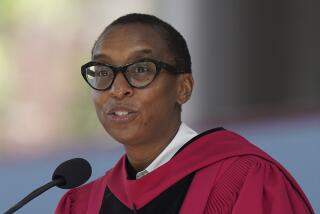PLAGIARISM WATCH : Footnote to a Life
- Share via
The revelation that Dr. Martin Luther King Jr. plagiarized words and ideas in his doctoral dissertation and graduate school essays while a student at Boston University should be met more with sorrow than with anger.
Researchers working on the King Papers Project at Stanford University have found a disturbing pattern of misappropriation and a failure to give full credit for words, phrases and concepts contained in academic papers. Whether the borrowing was careless or calculated, the young theology student should have known better.
The lack of adequate footnotes and quotation marks certainly calls into question King’s early academic work. Without excusing the dishonesty, Clayborne Carson, the Stanford history professor who heads the King Papers Project, puts the painful truths into perspective when he says King “was just a flesh-and-blood human being with flaws and limitations.”
King may not have been a great scholar, but youthful errors cannot diminish his later accomplishments. The young minister was just out of graduate school when he led a bus boycott in Montgomery, Ala., that ultimately desegregated every public facility at a time when racial segregation was either law or custom. His bold and courageous crusade for justice for all Americans ultimately led to federal laws that prohibit racial discrimination in jobs, housing, public facilities and at the ballot box.
It has been known for some time that Martin Luther King Jr. was not a perfect man. But few men have ever had a more perfect message.
More to Read
Sign up for Essential California
The most important California stories and recommendations in your inbox every morning.
You may occasionally receive promotional content from the Los Angeles Times.













